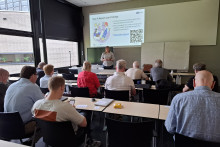Computer Science (INF) and Philosophy and Social Sciences (WMW).
No more hassle with the election summons that cannot be tracked down right before the election; no longer in all weathers to the poll booth; every day a reminder that your democratic right is patiently waiting for you. Electronic voting increases the comfort for the voter, a mouse click will do.
Yet comfort is not the thought behind digital voting on campus. The initiative, from the University Council, is inspired by the miserable turn out at previous elections. The U-Raad hopes that voting at home will boost the ten to twelve percent of the years before.
The CIV takes care of the technical side of the test. Co-ordinator M. Roelofs-Kamphuis: 'We test the application we have built next week in the faculties INF and WMW. We ask all students and staff to fill in a questionnaire. We then still have three months to repair potential technical teething problems.'
Online voting has some very specific problems associated with it. The voter has to be able to identify himself. Roelofs-Kamphuis: 'Students use their student number and a password, staff a password and their username. As soon as a vote is cast, the system will check in a separate database whether this person is eligible to vote.'
It is crucial that every person can only vote once and not more often. Moreover, the content should by treated in the strictest confidence. 'The line should be secured', according to Roelofs-Kamphuis. 'The data is encrypted, so that the vote cannot be traced back.' On screen all electoral lists will be shown. If one clicks on an eligible person, a photograph with a short description will appear.
The U-Raad practices in two faculties with a small-scale questionnaire. The initial KPS-plan was to make it into a UT-wide referendum. KPS-councilmember and U-Raad chairman Dick Meijer: 'This would kill two birds with one stone: both a test for the elections and a broadly-based opinion-poll on the line of the executive board.'
Meijer was considering questions on the (then) Heartbeat memo and the Berenschot report, but especially the UReka party in the council did not really see the point.
Chairman of the UReka party in the council Bj÷rn Prevaas: 'If at that moment everybody could have vented their spleen, it wouldhave been chaos. A referendum like that is rather provocative. To us it did not seem sensible, especially because the crisis in the university's administration was at that moment at its peak.'
Meijer: 'I did sound out Frans van Vught at an earlier date about introducing a corrective referendum. He did not like that idea at all. This despite the fact that he is a confirmed D'66 supporter, the party advocating referenda.' Meijer and Prevaas, political opponents, also fight over the spiritual fatherhood of electronic voting.
'It is thanks to UReka that online voting is coming. We, together with the CIV, have put the thing on the rails.' Meijer: 'Nonsense. The idea is mine. UReka opposed more than supported it. Ask the registrar.' J. Ribberink-van Middelkoop, registrar of the U-Raad and co-ordinator of the working group voting online: Er.. Dick Meijer introduced it, yes.'







